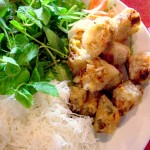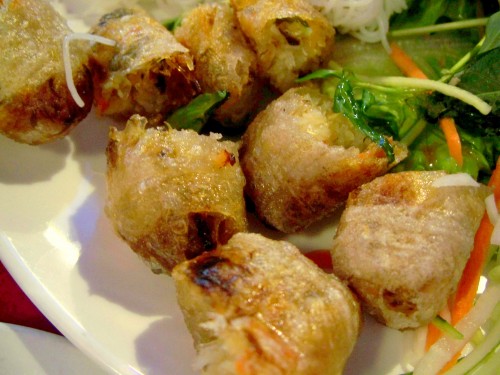
The laminated page has Goi Cuon next to Fritures de Calmars, Bo Luc Lac between Rossini style Tournedos and Agneau. Funny interlingual names like “Ap Chow Bo” and “Ap Chow Hai San” precede English descriptions of stir fries. Don’t bother google “ap chow”. Such innovative term doesn’t exist outside the menu of Bodega Bistro. Just like the dialogues between Jim and Huckleberry Finn, names like these can’t be understood unless you speak it out loud in your head. Ap chow is áp chảo, “press against the pan”, a Vietnamese way of saying pan fry. Why did the chef phonetically transform it into Chinese, while keeping Goi Cuon and Bo Luc Lac true to their original spellings? I don’t know, but I got a chuckle out of it.

The menu alone, however, didn’t strike me as anything unusual. This wasn’t the first time I had to decode a strange name for a familiar dish. Vietnamese menus tend to have such mix between trying to keep the Vietnamese name and (mis)translating it into some other language. The unusual thing was that our thought-to-be-Vietnamese waiter didn’t understand me when I said the dishes’ names in Vietnamese. Then I noticed Chinese songs blasting shuo shuo in the background. And Chinese conversations between the waiters. And, shame on Vietnamese restaurants, very good service.
More on the service part later. But I have a small grudge against Chinese restaurants dishing out Vietnamese food. It’s probably rooted in the powerless distress at the rice-paper-wrapped-and-fried spring roll confused with the Chinese egg roll, or the names of vegetables, fish, and New Year festival with the word “Chinese” attached to it, as if China were the whole Asia. Not that it’s the Chinese’s fault. To my mind, the Chinese have enough dishes of their own, they don’t need to adopt our recipes and innocently serve them without reference. Likewise, I feel slightly vexed by orange chicken and sweet-and-sour pork on Vietnamese menus, things that just mean to attract the safe eaters.